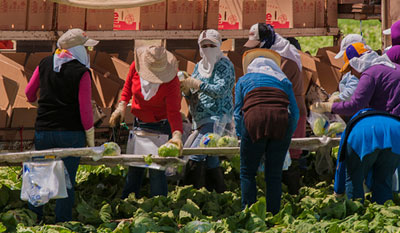| Food Equity Symposium
Student Writing Competition

|
| We currently have an inequitable food system that disproportionately burdens the poor and marginalized with its costs and failings. This inequity is reflected throughout all aspects of the food cycle, from poor labor conditions and wages for workers involved in the production and distribution of food to differences in access to healthy foods between poor neighborhoods and wealthier ones. The result is that in the United States, one of the wealthiest nations in the world, nearly 50 million people have trouble putting food on the table each day. Moreover, workers all across the food system struggle to earn wages above the poverty line. This disparity is reflected in food retail workers suffering double the rate of “low” or “very low” food security as the general population.
UC Irvine School of Law and the UC Global Food Initiative will co-sponsor a symposium at UC Irvine March 11–12, 2016 that takes up the issue of food equity and posits that in an equitable food system, all people have access to sufficient healthy and culturally appropriate food, and no person or community suffers from a disproportional burden of food production impacts. “Food equity” encompasses the adverse effects of both the production and distribution of food that marginalized communities face. On the food production side, equity concerns include (1) wages and working conditions of people producing food at every step along the food chain—from farm to restaurant and grocery store; (2) access to the means of food production (including access to land, to production subsidies, and to capital); and (3) protection from food production-related environmental contamination (such as air and water pollution, pesticide contamination, and noxious odors). On the food distribution side, equity concerns arise because many people lack sufficient access to healthy food options. Poverty, geographical disadvantages, and exploitive marketing all hinder access in marginalized communities.
As a part of this initiative, the symposium organizers have created a student writing competition open to all current students and 2015 graduates of University of California law schools.
The winner of the competition will (1) receive an award of $500; (2) have the opportunity to present his/her work at the symposium; and (3) have the opportunity to submit the paper for publication in the symposium issue of the UC Irvine Law Review.
All submissions must address some aspect of food equity, which we have defined broadly to account for those circumstances in which food operates as the cause or sets the context for subordination and inequality. This includes topics arising within the field of food law but it also can include other areas of law such as those governing immigration, health, and the environment. Submissions must not have been published or committed for publication.
To enter the competition, applicants must do the following:
- Submit a paper not exceeding 25,000 words, including footnotes.
- Remove any identifying information on the paper.
- Include a cover letter with the applicant’s name, year in school (or graduation), and school of affiliation.
The deadline to submit is 5 p.m. on Friday, Jan. 22. Please send all materials to Ana Duong (aduong@law.uci.edu). Please direct any questions or concerns to the symposium organizer, Professor Stephen Lee, at slee@law.uci.edu.
Photo by USDAgov / CC BY 2.0 | |
| |
| |
|